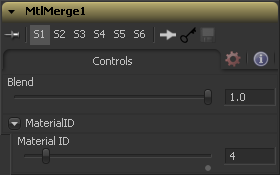Eyeon:Manual/Fusion 6/Mtl Merge 3D
From VFXPedia
[ Main Manual Page ]
- Blinn
- Channel Boolean Material
- Cook Torrance
- Mtl Merge 3D
- Phong
- Reflect
- Stereo Mix
- Ward
The Material Merge tool can be used to combine two separate materials together. This tool can be used to composite material tools, combining multiple illumination materials (Blinn, Cook Torrance) with texture tools (Bumpmap, Reflection) to create complex shader networks.
The tool also provides a mechanism for assigning a new material identifier to the combined material.
External Inputs
- MtlMerge3D.BackgroundMaterial
- [ orange, required ] This input will accept a 2D image or a 3D material to be used as the background material. A 2D image will be treated as a diffuse texture map in the basic shading model.
- MtlMerge3D.ForegroundMaterial
- [ green, optional ] This input will accept a 2D image or a 3D material to be used as the foreground material. A 2D image will be treated as a diffuse texture map in the basic shading model.
Controls
The Blend behavior of the Material Merge is similar to the Dissolve (DX) tool for images. The two materials/textures are mixed together using the value of the slider to determine the percentage each input contributes. While the background and foreground inputs can be a 2D image rather than a material, the output of this tool will always be a material.
Unlike the 2D Dissolve tool both foreground and background inputs are required.
This slider sets the numeric identifier assigned to the resulting material. This value will be rendered into the MatID auxiliary channel if the according option is enabled in the renderer.
Tips for Mtl Merge 3D (edit)
| The contents of this page are copyright by eyeon Software. |


